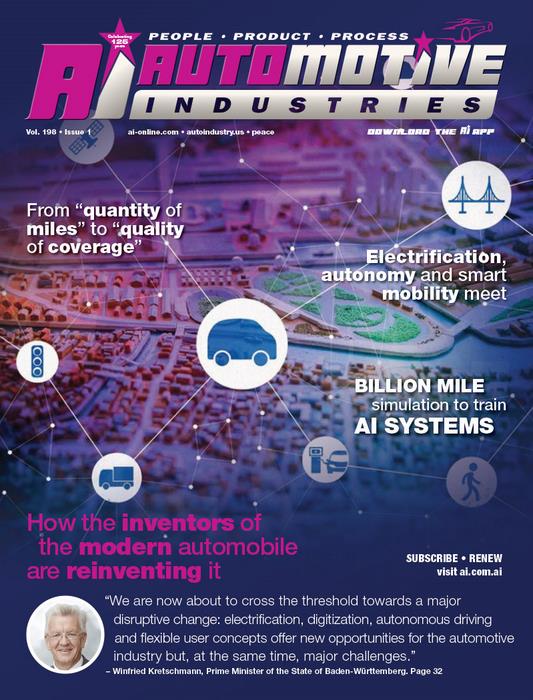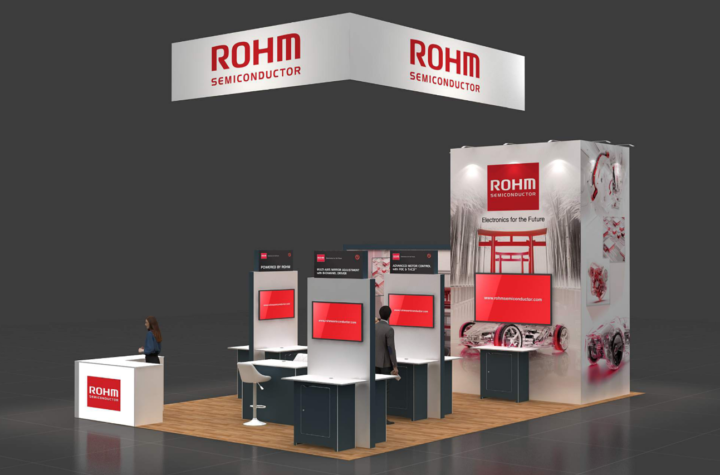
When Karl Friedrich Benz received the patent for what is seen as the first “practical” motor car on January 29, 1886, there was little or no understanding of how fundamentally the technology would disrupt the existing transport order and society as a whole
Now, 133 years later, the next generation of disruptive mobility technology is being developed in Benz’s birth-place of the German state of Baden—Württemberg. “We are now about to cross the threshold towards a major disruptive change: electrification, digitization, autonomous driving and flexible user concepts offer new opportunities for the automotive industry but, at the same time, major challenges,” says Prime Minister Winfried Kretschmann.
“Everything is contested. You can say that mobility is currently being re-invented, and this at a never before experienced pace. There is a lot at stake for Baden- Württemberg, including our technological leadership, our economic power, our jobs and the protection of our natural livelihood against the consequences of climate change. All stakeholders have to assume responsibility on this issue – the automotive industry, public transport, science, politics and the civil society “The State Government has therefore initiated a strategic dialogue for the automotive sector, which includes all these stakeholders. These challenges can only be faced if we stand together. Baden-Württemberg is the cradle of the automobile. Therefore, our objective must be a mobility of the future made in Baden-Württemberg,” he adds.
Benz laid the foundation for a vibrant automotive industry that employs more than 440,000 people in the state. The region has retained its technological lead, and three-quarters of the turnover of the more than 300 companies directly involved in automotive manufacturing is achieved in export business. As the center of the German automotive industry Baden Württemberg is home to over 1,000 parts suppliers.
It is characterized by a tightly meshed network of vehicle manufacturers and a strong parts-supply industry with mainly small and medium-sized enterprises, as well as by production equippers, service providers, universities and research institutions, all of which specialize in the automotive sector. This interlocking networked structure, which facilitates cooperation, is one of the building blocks on which the state’s success as a manufacturing location is based. There are more than 20 clusters and networks that actively promote innovation and bundle diverse synergies. With global players such as Daimler, Porsche and Bosch, the Stuttgart region is by far the most important automotive cluster within Europe.
The automotive sector is one of the most innovative in the state and invests nearly eight billion euros a year in research and development (R&D). This is half of the annual total R&D investment by Baden-Württemberg industry. With more than 70 universities and over 100 non-university research institutions, Baden- Württemberg is one of the top science locations in Germany. Innovation is supported by strong academic support in the form of numerous mobility-related degrees and diplomas such as technical design, process engineering, vehicle technology and automotive information technology.
This ensures there is a constant supply of newly qualified engineers. The academic institutions are also heavily involved in research. It is estimated that the state has the highest concentration of R&D in Europe. Some 5.1% of Baden-Württemberg’s gross domestic product is ploughed back into research and development. In order to focus this investment on the new age of mobility Baden-Württemberg has established a coalition of politics, industry, universities, employee associations, consumer organizations, environmental associations and general society.
Citizens help shape the future
The technological transformation leading to electrified, highly energy-efficient and smart mobility solutions will not only dramatically change the car, but also the manufacturing and energy sectors, amongst others. In order to meet the challenges, the state government has broken the strategic dialogue for the automotive sector into six areas covering the whole value chain. They are: R&D, production and suppliers; Sales and aftersales; Energy; Digitization; Traffic Solutions; and Research and innovation environment. An additional cross-cutting topic – Society and Mobility – links all the areas. The goal is to get citizens involved in the process, to encourage the inclusion of socially relevant subjects like health and environmental protection issues. The government has provided a platform for its citizens to voice their opinions, values and needs to contribute to the development of sustainable public and private mobility systems. The objective is to cast a new light on the interactions between technological innovations and social mobility change in rural and urban areas, as well as considering and balancing the consequences of the mobility revolution on other economic sectors.
“For all citizens, mobility is so much more than just a technological solution to get from A to B. Mobility is an essential need, inseparably connected for many people with values like freedom, independence and wealth. At the same time, increasing mobility is the root cause in our society of environmental and health problems. We therefore believe that it is of great importance to integrate individuals and citizens organized in civil action groups in the strategic dialogue for the automotive sector in Baden-Württemberg in this highly sensitive area,” says a state government release.
Addressing the challenges
Energy efficient and connected data-sharing vehicles will determine the product portfolios of the future. Production, development and sales processes will become shorter, more direct and connected. How can industry and research in Baden- Württemberg optimally adjust to these trends in order to benefit? What is the strategic value and job potential to be developed against the background of car and ride sharing and Big Data? Participants from industry, science and politics are working together in formal groups to analyze the central issue of how to enhance system competence and innovative strength in the automotive industry. Subjects like skilled labor and qualification are important focuses areas. The target is to establish public and corporate policies to prepare today’s and future employees in the best possible way for the upcoming changes, explains a release from the State Ministry, Baden-Württemberg.
“Baden-Württemberg is the cradle of the automobile. Therefore, our objective must be a mobility of the future made in Baden-Württemberg.”
Service station of the future
A state government study identified that new energy supply sources for an electrically-powered traffic and transport sector would differ dramatically from the traditional service station. One of the task groups is looking at how energy for future mobility solutions can be made available in the required volumes and at the right place and the right time. Decisions on how to smooth the transformation are being guided by systemic analyses and tested in pilot projects. Aside from electric battery-driven vehicles and their impact on the distribution grid, the role of hydrogen and fuel-cell technology as well as synthetic fuels is being taken into account. A reliable, environmental-friendly and economic energy supply based on renewable energies is the prerequisite for climate-compatible mobility and for exploring the huge potential of integrated energy.
At present, more than 94% of the traffic and transport sector is still powered by fossil fuel. But, worldwide, powertrains are more and more electrified: 2018, more than four million electric vehicles had been registered worldwide. Baden-Württemberg holds a leading position in a national comparison of federal states with almost 1,800 publicly accessible charging points. Nearly one out of six of the nationally publicly accessible 13,500 charging points is located in the state (as of June 2017). The expansion of the charging infrastructure is actively promoted within the scope of State Initiative III “Market Growth Electric Mobility BW”, planning to provide a charging station anywhere in Baden- Württemberg within a radius of 10 km. “Not only the vehicle as such will be profoundly altered through new technologies and digital possibilities, but sales processes and aftersales business will have to be modified accordingly. For example, 30% of used cars in 2016 were sold on online platforms and not established dealers. Even before approaching the sales people for the first time, buyers of new cars have gathered information from the manufacturer’s website. This is just one of the many developments being discussed in the working group Dealers and Workshops.
The focus is not only on changes in sales, but also aftersales services with alternative vehicle concepts for workshops and the digitization of more processes and new technologies in the parts processing, such as additive manufacturing. The target is ultimately to keep the strategically important interface to the end-user intact, even with the new business models. The state government is also looking at faster implementation of new solutions in order to keep Baden-Württemberg’s industry competitive. It hopes to use digitization focused local communities and municipalities, since they play a central role as the operators of digital infrastructures, connected mobility services and traffic systems. The other issue the government is trying to tackle is cutting CO2 emissions with new traffic solutions. “On the one hand, we are looking into effective measures and instruments at all levels of action which guarantee climate protection without regard of the technology. On the other hand, a discussion is held on how mobility may be meaningfully organized in the future for the benefit of all groups in the population and which vehicles and mobility services will be required to this end. Furthermore, pilot projects will be tested and implemented large scale throughout the state to give a hands-on experience of sustainable traffic solutions. This includes, e.g. ride sharing services as the new mainstay for public urban transport as well as automated bus lines,” says a ministry release.





More Stories
Baja SAE Carolina:
ROHM to Showcase Advanced Power Electronics at APEC 2025
ROHM Launches 650V GaN HEMT in a Compact, High-heat Dissipation TO-Leadless Package